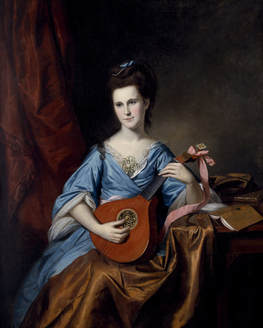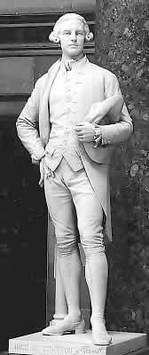Multiple Slaves in the Rush Household?
|
There has been earlier speculation that William Grubber was not the only slave living in the Rush household. Rush's wife, Julia Stockton, came from a slaveholding family in Princeton, New Jersey, and there was a possibility that Julia may have brought one or more slaves with her into her marriage with Rush. One figure who seemed like a likely candidate was Marcus, the servant Rush once mentioned in a letter to Julia during the yellow fever epidemic of 1793. Marcus had assisted Rush during this epidemic, and proven himself of great help to Rush. But was he doing so as a servant or as a slave?
|
Marcus, the Stocktons' Slave
Marcus came to work for Benjamin Rush largely in part thanks to Julia Stockton, Rush's wife. Julia was the daughter of Richard Stockton, Rush's friend and fellow signer of the Declaration of Independence. Richard Stockton was a prominent lawyer from Princeton, New Jersey, as well as a slaveowner. One of his slaves, Marcus Marsh, grew up under unusual circumstances. His mother, also a slave in the Stockton household, died when Marsh was an infant. Annis Stockton, Richard Stockton's wife and mistress of the household, nursed Marsh herself:
The numberless times...the poor fellow...nursed at my breast...[I] brought him up almost as my own son. [1] It was unusual for a mistress to act as a wet nurse for one of her child-slaves. Also unusual was Marsh' education: unlike most slaves in the North American colonies, Marsh knew how to read and write by the time he reached adulthood. Historian Hugh Howard speculates that it was Annis who taught Marsh how to read and write, much like how she taught her own children.
Given Marsh' treatment as a child, it would appear as though the Stocktons, Annis in particular, may have, at times, viewed him as a member of their own family. But this did not change the fact that he was still a slave: once Marsh had matured, he began to work as a farmhand and coachman for Morven, the Stockton family's estate. [2] Then, in 1781, tragedy struck the Stockton family: Richard Stockton, after suffering from a painful "cancer of the lip that spread to his throat," died in February of 1781. [3] Stockton's will, drafted in 1780, gave his wife, Annis, the power to "at 'her discretion...grant freedom' to any deserving slave." [4]
|
Did Annis grant Marsh his freedom? There is evidence to suggest that yes, she did. Both the Bicentennial History of the Black Community of Princeton, New Jersey and a collection of essays from the National Archives seem to suggest that Annis granted Marsh his freedom upon her husband's death. After Stockton's death and his own manumission, Marsh went to Philadelphia to work for Benjamin Rush, who had married into the family that cared for Marsh since he was a child. [5] When the yellow fever epidemic hit and Marsh was working as a nurse assisting Rush, he was doing so as a free man.
Sources Used
[1] Hugh Howard, Houses of the Founding Fathers: The Men Who Made America and the Way They Lived (New York: Artisan Books, 2007), 113. [WEB]
[2] Howard, Houses of the Founding Fathers, 113.
[3] "Richard Stockton," Independence Hall Association (2017). [WEB]
[4] Howard, Houses of the Founding Fathers, 113.
[5] Ibid., 113.
[2] Howard, Houses of the Founding Fathers, 113.
[3] "Richard Stockton," Independence Hall Association (2017). [WEB]
[4] Howard, Houses of the Founding Fathers, 113.
[5] Ibid., 113.


